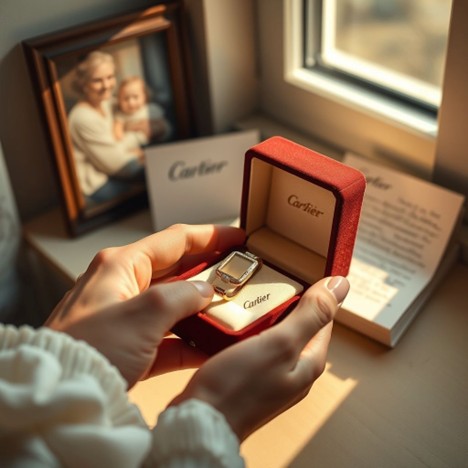What Affects the Resale Value of Cartier Jewelry?
Thinking of Selling Your Cartier Jewelry?
Before you do, understand what really determines its resale value.
Letting go of a luxury piece like Cartier isn’t just about dollars and cents. It can feel like saying goodbye to a chapter of your life. Maybe it’s an heirloom. Maybe it marked a milestone. Whatever the reason, parting with fine jewelry can stir more than financial questions—it often stirs emotion. And in a market that feels anything but clear, knowing what drives value can be the difference between confidence and second-guessing. This guide breaks it down, piece by piece.
Brand Legacy and Recognition
Cartier isn’t just a brand—it’s a statement. For over 177 years, it has stood for craftsmanship, elegance, and status. And that long-standing reputation plays a big role in resale potential.
Why does this matter when selling Cartier jewelry?
- Heritage and trust: Buyers know Cartier. That kind of global recognition builds trust and, in turn, demand.
- Timeless appeal: Cartier isn’t about chasing trends. Its designs are iconic—from the Tank watch to the Love bracelet—and that kind of staying power helps maintain value.
- Scarcity adds spark: Limited editions or discontinued pieces can attract collectors who want what others can no longer find.
Still, not every Cartier piece guarantees a high return. Prestige matters, yes—but only as part of the bigger picture.
Condition, Care, and Documentation
The story your jewelry tells begins with how it’s aged.
A flawless surface? Original components? That matters. A piece that’s been lovingly worn but carefully preserved will almost always inspire more confidence in buyers than one with dings, scratches, or replaced parts.
- Visible wear can lower perceived value quickly.
- Original finishes and components signal integrity.
- Service history from Cartier itself adds another layer of assurance.
- Boxes, certificates, and receipts do more than complete the package—they authenticate it.
Even a small repair done outside Cartier can raise red flags. For buyers, provenance isn’t just paperwork—it’s proof. And when you’re looking to sell Cartier jewelry, proof of origin can be the deal-maker.
Design, Collection, and Popularity Trends
Some designs become timeless. Others? Not so much.
Cartier’s most iconic collections tend to do better in resale. Pieces from the Love, Juste un Clou, or Panthère lines often attract consistent demand. Why? Because these collections have become cultural touchstones—recognizable and revered.
- Matching sets or full ensembles tend to hold stronger appeal.
- Discontinued items can carry intrigue, especially for collectors.
But it’s not just about the name. A lesser-known or niche design might not spark the same interest, even if it’s Cartier. Tastes shift. Trends evolve. And that affects how quickly—and for how much—a piece sells. That’s something worth keeping in mind if you’re considering selling Cartier jewelry now versus later.
Market Timing and Resale Channel Choices
Timing, as they say, can be everything.
Broad economic conditions, shifts in luxury spending, and even the time of year can influence buyer behavior. High-end jewelry often sees increased interest around major gift-giving seasons or during broader upswings in luxury demand.
Then there’s the how of selling:
- Auctions might fetch higher bids for rare or in-demand items—but can involve fees and waiting periods.
- Resellers provide ease, though that convenience comes with a tradeoff in control or pricing.
- Private sales allow for more negotiation, but require trust and effort.
There’s no one-size-fits-all channel. It depends on your goals—speed, simplicity, or securing the best possible offer. Choosing the right path to sell Cartier jewelry is part strategy, part comfort level.
Emotional and Financial Decision Factors
Selling a Cartier piece can feel strangely personal. You’re not just parting with metal and stone. You’re letting go of memories, sentiment, maybe even a status symbol.
- Emotional reluctance often shows up when a piece has a family backstory or commemorates a milestone.
- Social perception can add pressure too. Some worry what others might think about the decision to sell a high-end item.
- Anchoring bias — mentally tying a piece’s worth to its original price — can skew realistic expectations.
And that’s okay.
Selling isn’t only about market value—it’s also about feeling settled with the decision. That happens when you:
- Understand what drives resale value
- Know what your piece realistically commands
- Feel supported by clear, honest guidance
A well-informed decision doesn’t just protect your wallet. It protects your peace of mind.
Conclusion: Key Takeaways Before Selling Your Cartier Jewelry
If there’s one takeaway, it’s this: resale value isn’t one-dimensional.
It’s shaped by:
- The reputation Cartier has earned over nearly two centuries
- Your piece’s condition, documentation, and design
- How well it matches current demand
- When and where you choose to sell it
- Your ability to navigate the emotional terrain of letting go
Selling wisely means selling when you’re ready—with eyes open and options in front of you.
If you’re preparing to sell Cartier jewelry, taking the time to evaluate these factors can help ensure the outcome aligns with both your expectations and your investment.
FAQs
Q: How can I tell if my Cartier jewelry will hold its value?
A: Condition, completeness, and collection matter. A well-preserved piece from a popular line, backed by full documentation, typically retains value better than one missing key elements.
Q: Do original receipts and packaging really make a difference in resale value?
A: Absolutely. They help confirm authenticity and reassure buyers. That alone can influence both interest and offers.
Q: Is it better to sell Cartier jewelry online, at auction, or through a reseller?
A: Each option offers something different. Auctions may get attention for rare pieces. Resellers are convenient. Private sales give you more say. The right fit depends on your goals.
Frequently Unasked Questions (FUQs)
Q: Can a minor repair by a non-Cartier jeweler impact my resale price?
A: Yes. Even subtle work by a third-party can affect buyer trust and perceived value.
Q: Does the market value of gold or platinum significantly affect Cartier resale value?
A: It contributes, but not as much as brand, design, or demand. Luxury resale is about more than metal weight.
Q: Could insurance appraisals mislead me on resale expectations?
A: They can. Appraisals often reflect replacement cost, which isn’t the same as what buyers are currently paying on the secondary market.

